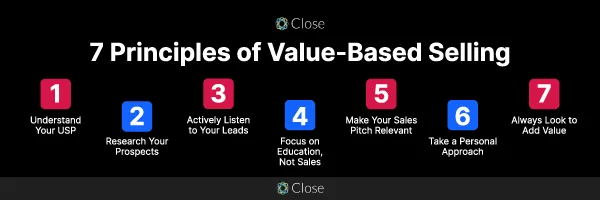
Your prospects are bombarded with sales messages. Every Tom, Dick, and Harry wants to sell them something, which is why some people avoid sales reps if they can.
Value based sales techniques flip the script and turn "sell at all costs" salespeople into reliable consultants who care about prospects and constantly look to serve them.
Fortunately, the value based sales process isn't rocket science. You just need to follow the tips and tricks I outline in this article, then work hard to master them.
Sound like a plan? Then keep reading to learn what value based selling is, the seven sales tips to implement this selling process, specific discovery questions to ask, and three value based selling examples you can use for inspiration. We have a lot to get to, so let's dive in!
What Is Value Based Selling?
Imagine you sell project management software for a living. How would you use a value based strategy to supercharge your results? Well, you'd probably start by talking to your prospect. You need to discover why they're interested in the solution you sell.
A quick conversation might reveal that Mr. Prospect is pretty unhappy with his team's current productivity levels. He's looking for a tool to assist them in this area.
BOOM! You're off to the races! Now that you understand Mr. Prospect's pain point, you can deliver a more targeted sales pitch. You can talk about all of the time your customers save by using your product, rather than how your tool displays projects in multiple ways.
I'll be completely honest with you, the value selling framework is more labor-intensive than other sales methodologies. But the benefits are clear: once you adopt this sales process, you and/or your sales team will build trust with prospects faster. Doing so will help you close bigger, better deals in less time and boost your company's customer retention metrics.
Sounds pretty great, right? You're not the only one who thinks so. New research shows 87 percent of high-growth companies have implemented a value selling approach.
Understanding the 4 Types of Value in Sales
Value lies at the heart of the sales process. But value goes beyond the price tag, encompassing the perceived benefits, advantages, and outcomes that customers can expect from a product or service.
By tailoring your value to each customer's needs, you can align your offerings with the customer's objectives, address pain points, and establish a strong foundation of trust. So what types of value do customers care aboue?
- Money made: CRM software, for example, helps sales reps keep track of their leads. When they have access to this information, they can guide prospects to the right products and/or services, increasing the likelihood of a sale. Show how your offerings help customers put more green in their pockets.
- Money saved: Productivity software, on the other hand, saves teams time. Since time is money, this kind of tool can help users save more of the cash they've worked so hard to make. Show how your offerings help customers win back revenue.
- Risk reduced: Maybe your product/service helps customers minimize threats. Business consulting services are a good example of this. By teaching companies how to accomplish objectives the right way, consultants ensure said companies avoid potential loss. Show how your offerings reduce risk.
- Qualitative value: Sometimes, a product or service will provide customer value that can't be backed up by cold, hard numbers. Customer survey software, for instance, might not directly affect your bottom line. But the insights gleaned from it can propel a company forward. Share anecdotes that speak to qualitative value.
Focusing on true value increases the number of deals you'll close and fosters long-term satisfaction and loyalty, as customers recognize the value they receive from their investments.
Incorporating the waterfall methodology into value-based sales equips the sales process with a structured and systematic approach. By applying this methodology, each phase of the sales strategy is meticulously planned and executed in a sequential manner, building upon the previous one.
The 7 Steps of the Value Based Sales Process
Modern sales is all about trust. Value based selling teaches salespeople to prioritize their prospect's needs over their own, which naturally makes them more trustworthy.
But, of course, telling yourself to put prospective customers first and actually doing it are two different things. To make sure you get the process right, follow these seven tips.
 |
1. Nail Down Your USP
Your unique selling proposition, USP for short, is something that differentiates your company from your competitors. It could be a reputation for premium products. Or a killer warranty. Or the promise to help potential customers do [insert thing] better than everyone else.
Here's the deal: you need to know your company's value proposition like the back of your hand. That way you can articulate the ways you help prospects.
If you don't know your company's USP, study the products/services you sell. What's so special about them? Why should someone invest in your offerings instead of a competitor's? What's that one thing distinguishing your brand from all the other brands?
Before you implement a value based sales process, you must have a solid understanding of your company's USP. It's absolutely essential—don't skip it!
2. Get to Know Your Prospects
Remember, success in value based sales requires sellers to put customers' needs above their own. You can't do this unless you understand what those needs are.
Look to uncover the following bits of information during the research process:
- Current role and previous experience: Log in to LinkedIn to see when your prospect began their current role and the positions they held in the past. Their level of experience will help you determine how you can best serve them.
- Common connections you may have: Do you know any of the same people as your prospect? If so, you may be able to build trust with them faster. You can also approach your mutual contact and ask for information regarding your prospect's needs.
- The kind of content they share on socials: Next, look to see if your prospect has a public Facebook, Instagram, or Twitter profile. Then study the content they've been sharing on social media. This will help you learn about their current initiatives.
- Information about their company: You should also research your prospect's company. Has there been a leadership change? Have they released any new products? Who are the decision-makers? A quick website search can reveal these details.
- Data about them in your company's CRM: Finally, scan through your CRM of choice to see if anyone in your company has previously talked to this person. The last thing you want to do is rehash old information, which will only serve to waste time.
Always research your prospects before you get on the phone. That way, you can add unique value from your first conversation with them.
3. Actively Listen to Your Leads
If you're serious about the value-added selling methodology, you'll research your prospects before you talk to them on the phone (see above.) Just be careful!
Advanced knowledge, while incredibly important, can make sales reps feel like they're already familiar with their prospect's needs. As such, they often jump right into their sales pitch without giving prospects time to speak. This is a huge mistake for two reasons:
- It makes the sales process about you: Value based selling should always be about the prospect. One of the easiest ways to ensure this happens is to let prospects talk.
- Your research might not be 100 percent accurate: Your prospect might share a bunch of cat videos on Facebook. That doesn't necessarily mean they love cats. Give your prospects the floor so that you learn exactly what their problems are.
Get your prospects on the phone and then listen to them. Let them tell you about their current situation, the challenges they face on a day-to-day basis, etc. Doing so will help them trust you more. It will also give you a deeper understanding of how you can add value.
 |
4. Focus on Education, Not Sales
As mentioned above, value based selling is effective because it turns sales reps into reliable consultants. To achieve this, focus on teaching prospects, not selling to them.
You can do this in a number of ways:
- Suggest ways to overcome specific challenges: What problems do your prospects deal with? Recommend ways to fix these particular issues.
- Share how others solved similar problems: How have others overcome the challenges your prospect is working through? Share details about these situations.
- Teach them about the latest industry changes/trends: What's happening in your industry, and how does it relate to your prospect? Educate them on new trends and important changes so that they're fully prepared for the future.
Ideally, the solution to your prospect's problem will be the product and/or service you sell. By taking an educational approach to sales, however, your interactions with prospects will feel more like teaching experiences than sales pitches, which will help you earn their trust.
5. Make Your Sales Pitch Relevant
Your product does a dozen different things and is capable of solving a wide range of problems. Your prospects only care about the problems they've personally experienced.
To properly implement the value based selling methodology, you need to make the sales pitch relevant to each prospect, which means focusing on the product and/or service features they care about. (Hint: the ones that will help them overcome immediate challenges.)
One of the best ways to make your sales pitches relevant is to answer the question, "So what?" Prospects don't need to know that your product does X, Y, and Z. They need to know how your product will improve their current situation.
If a specific feature isn't relevant to a prospect, don't mention it during the sales process. This can be difficult, especially if the irrelevant feature is a competitive advantage. But talking about it won't help your prospects, so it has no place in value based sales.
6. Take a Personable Approach
Pay attention to your demeanor and tone of voice while interacting with prospects. Are you perceived as friendly? Here are a few ways to make sure you are:
- Speak like you're talking to a friend: Prospects should feel comfortable when they talk to you. If they don't, you'll never become a trusted advisor, or find success with value based sales. An easy way to put prospects at ease is to talk to them in a conversational tone, as if you were speaking to a close friend.
- Ask prospects open-ended questions: We'll talk more about open-ended questions in the next section. For now, just know that an open-ended question is one that can't be answered with a simple yes or no. Asking prospects these questions will make them feel like you care about them.
- Engage in small talk when appropriate: Some people despise small talk. "Why would anyone want to waste time on meaningless chit-chat?" they wonder. Because small talk is a great way to build rapport with prospects and will make you seem more personable. So don't be afraid to ask prospects about their professional interests, events they plan to attend soon, and similar topics.
7. Always Look to Add Value
Finally, make sure that every interaction you have with prospects adds value.
You can do this by simply listening to their problems. Or sending them helpful articles and case studies. Or suggesting specific solutions to help them overcome their challenges.
No matter what you do, make sure you highlight at least one of the four types of value we covered earlier in the article:
- Money made
- Money saved
- Risk reduced
- Qualitative value
Different prospects want different things. During the value based sales process, your job is to pinpoint what your prospects find valuable, then provide it to them.
Doing Discovery? Ask These Value Based Selling Questions
When it comes to discovery, open-ended sales questions work best.
As mentioned earlier, an open-ended question is one that can't be answered with a simple yes or no. Because of this, open-ended questions give prospects space to talk, which makes them feel important. They also give sales professionals deeper insights.
Here are four open-ended, value based selling questions to ask your prospects:
“What Does Success Look Like to You?”
You can't use value in sales until you understand your prospect's end goal.
Asking, "What does success look like to you?" will help you understand what they want to achieve, which will then help you determine how your products/services can be beneficial.
This question is also fun to answer—who doesn't like talking about their ultimate success? Giving prospects a chance to expound on this topic will build rapport.
“What's Keeping You From Achieving Your Goals?”
Customers make purchases to solve problems.
Asking, "What's keeping you from achieving your goals?" cuts to the heart of this issue. The answers you get back will tell you how to proceed with your value based selling approach.
Let's pretend, for example, that a prospect came to Close and said, "My revenue is down, and I don't know if I'll be able to pay the bills next month. I need to boost sales ASAP!"
Now that we know their main pain point, we know how to add value to the rest of the buying process. In this situation, we'd say something like, "Close gives you the ability to automate repetitive sales tasks and eliminates data entry, so you can sell faster."
“Have You Done Anything in the Past to Solve This Problem?”
Failed solutions aren't valuable.
Before you suggest a specific course of action, ask your prospects, "Have you done anything in the past to solve this problem?" That way, you can learn what hasn't worked for them.
Armed with this information, you can suggest new ideas that will, hopefully, prove successful. You can also achieve differentiation for your products and/or services by explaining how they're better equipped to deal with your prospect's current predicament.
“What Will Happen If You Don't Solve This Problem for Your Company?”
Your prospects know they have a problem. That's why they agreed to talk to you. But do they realize the many ways in which this problem could affect their business down the road?
Asking, "What will happen if you don't solve this problem for your company?" catapults prospects into the future and makes them consider the negative effects of the issue(s) they have. This will often motivate them to act right now, not later.
Also, try to flip this value based selling question around and ask, "If this problem was solved today, how would it impact your business?" This will force your prospects to think about the benefits they'll achieve when they settle on the right solution, leading to more sales.
3 Value Based Selling Examples
Sometimes, it helps to "see" a sales methodology in action. To help you fully grasp value based selling, here are three examples, each in a different industry:
SaaS
There are a ton of SaaS apps out there. Using a value based sales strategy can help you cut through the noise and reach your target audience with a message that will resonate.
One way to provide value throughout the entire sales cycle is to offer different pricing tiers. Doing so will enable customers to purchase the features they want, at a price they can afford. Discounted annual billing plans are another value-add that can benefit customers.
If your sales leaders decide to use these two strategies, you can have honest sales conversations with your prospects. The goal? To uncover said prospect's pain points. You can then suggest the pricing tier that will best meet their needs. And if the prospect is cost-conscious, you can follow up with an annual discount offer. It's a win-win situation.
 |
Interested in boosting your revenue? Learn about the power of challenger selling.
Real Estate
Buying a house is a major decision. Folks in this position want to work with a knowledgeable professional who cares about their specific needs, not just the commissions they'll earn.
It makes sense. If a potential homeowner buys the wrong house, it could have devastating financial ramifications—ones that follow them around for years, if not decades.
To prove to your clients that you're the right realtor for the job, use a value based selling approach. You can do this by asking your clients detailed questions about what they need in a house. When you have this information, only show them listings that meet their criteria.
And always be honest with your clients. If you have concerns about a specific house, or feel that it won't suit the homebuyer you're serving, speak your mind. This will help you earn their trust and establish a reputation for integrity in your real estate marketing efforts. If that happens, it won't reflect well on you and could affect your real estate business in the future.
Financial Services
What about professionals in financial services? Yes, value based selling can benefit you, too.
Maybe you're a wealth manager or investment banker. Maybe you help individuals find insurance policies, or small businesses do their taxes. Whatever the case may be, you need to prove to your clients that your services are advantageous in some way.
Start by getting to know your prospects, as we talked about in the section above. What are their financial goals? What kind of insurance do they need to have peace of mind? What questions do they have regarding state and federal tax codes?
Then frame your value to address these goals, concerns, and/or questions.
A wealth manager, for example, might say something like, "I see that you want to develop a financial plan that will help you maintain a monthly budget, increase your savings, and start investing in the stock market. We help people do this all the time. In fact, we just helped a relatively new client double their savings in six months! Here's what we suggest…"
Win With a Value Based Sales Approach
Value based sales is an effective strategy. Once you master the fundamentals, you'll be able to earn prospects' trust, close deals at a more consistent clip, and reduce customer turnover.
I won't tell you it's easy (it's not.) But if you implement the value based selling strategies in this article, you will get better at this unique approach to sales—promise!
Looking for an easier way to propel your company forward? Get Close, the all-in-one CRM for growing sales organizations. Start your 14-day trial today to see if it's the right tool for you.










